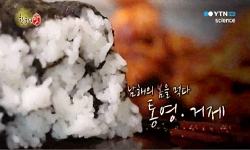굿은 미신으로 주민을 현혹하고 쓸데없이 마을의 예산을 낭비한다는 선입견을 갖고 있는 게 일반적인 생각이다. 이 연구는 이러한 선입견에 의문을 가지고 마을과 무가 사이의 사회문화적 ...
http://chineseinput.net/에서 pinyin(병음)방식으로 중국어를 변환할 수 있습니다.
변환된 중국어를 복사하여 사용하시면 됩니다.
- 中文 을 입력하시려면 zhongwen을 입력하시고 space를누르시면됩니다.
- 北京 을 입력하시려면 beijing을 입력하시고 space를 누르시면 됩니다.

19세기 후반 이후 거제 통영 海村의 별신굿 기획과 賞錢의 탄생 -게임이론으로 본 마을과 巫家 사이의 사회문화적 관계- = The Planning of Byeolsingut and the Birth of Sangdon in Sea Villages of Geoje and Tongyeong Since the Late 19th Century -A Social and Cultural Relationship Between Villages and Shamanic Families Through Game Theory-
한글로보기https://www.riss.kr/link?id=A109588491
-
저자
허모영 (동아대학교)
- 발행기관
- 학술지명
- 권호사항
-
발행연도
2025
-
작성언어
Korean
-
주제어
Byeolsingut ; sangjeon (reward money) ; pyodon (token money) ; game theory ; Geoje ; Tongyeong ; village documents. ; 별신굿 ; 상전(賞錢) ; 표(票)돈 ; 게임이론 ; 거제 ; 통영 ; 마을기록물
-
등재정보
KCI등재
-
자료형태
학술저널
-
수록면
395-430(36쪽)
- 제공처
-
0
상세조회 -
0
다운로드
부가정보
국문 초록 (Abstract)
상전은 별신굿이 연행될 때 주민들이 무가가 굿을 잘하여 흥이 나거나 희구하는 바가 큰 굿거리에 ‘상이야’ 하면서 주는 상금과 같은 돈을 말한다. 상돈은 주민들이 직접 현금으로 주기도 하지만 마을 동중(洞中)에서 표로 돈을 만들어 주민들에게 나누어 준 뒤 굿에 사용하도록 하고 무가는 굿이 끝난 뒤 그 표돈을 동중에서 현금과 바꾸어 가도록 만든 기획과 연출이다.
무가와 마을 조직이 굿 경비를 결정함에 있어 원채와 상돈을 두고 서로 협상을 벌이는 상황이 바로 게임 상황이라 할 수 있으며 상돈과 원채를 두고 서로 불이익을 당하지 않도록 전략적 행동이 필요하다. 이러한 마을과 무가 사이의 관계는 한정된 자원을 어떻게 하면 효율적이고 공평하게 나누어 가질 수 있는지에 초점을 맞추는 일종의 게임이론으로 설명할 수 있다. 동중은 표돈을 지급하고 그 내역을 기록으로 남겼는데, 표돈은 거제 통영지역 별신굿 연행의 중요한 특징의 하나이며 별신굿에 대한 동중의 합리적 연출이자 행동이론이라 할 수 있다.
이처럼 상돈을 중심으로 무가와 마을 간의 사회문화적 관계를 게임이론으로 접근한 이 연구는 별신굿이 다양한 학문 분야에 접목하여 연구를 이어갈 수 있는 시도로서 가치를 가진다.
굿은 미신으로 주민을 현혹하고 쓸데없이 마을의 예산을 낭비한다는 선입견을 갖고 있는 게 일반적인 생각이다. 이 연구는 이러한 선입견에 의문을 가지고 마을과 무가 사이의 사회문화적 관계를 게임이론으로 살펴보고자 한다. 이 이론의 바탕이 되는 연구자료는 거제 통영지역 지동궤에 전승되어 오는 별신굿 기록물 중 상전(賞錢) 기록이다.
상전은 별신굿이 연행될 때 주민들이 무가가 굿을 잘하여 흥이 나거나 희구하는 바가 큰 굿거리에 ‘상이야’ 하면서 주는 상금과 같은 돈을 말한다. 상돈은 주민들이 직접 현금으로 주기도 하지만 마을 동중(洞中)에서 표로 돈을 만들어 주민들에게 나누어 준 뒤 굿에 사용하도록 하고 무가는 굿이 끝난 뒤 그 표돈을 동중에서 현금과 바꾸어 가도록 만든 기획과 연출이다.
무가와 마을 조직이 굿 경비를 결정함에 있어 원채와 상돈을 두고 서로 협상을 벌이는 상황이 바로 게임 상황이라 할 수 있으며 상돈과 원채를 두고 서로 불이익을 당하지 않도록 전략적 행동이 필요하다. 이러한 마을과 무가 사이의 관계는 한정된 자원을 어떻게 하면 효율적이고 공평하게 나누어 가질 수 있는지에 초점을 맞추는 일종의 게임이론으로 설명할 수 있다. 동중은 표돈을 지급하고 그 내역을 기록으로 남겼는데, 표돈은 거제 통영지역 별신굿 연행의 중요한 특징의 하나이며 별신굿에 대한 동중의 합리적 연출이자 행동이론이라 할 수 있다.
이처럼 상돈을 중심으로 무가와 마을 간의 사회문화적 관계를 게임이론으로 접근한 이 연구는 별신굿이 다양한 학문 분야에 접목하여 연구를 이어갈 수 있는 시도로서 가치를 가진다.
다국어 초록 (Multilingual Abstract)
Sang-jeon refers to money given by residents when they become excited by the shamans' excellent performance or during particularly meaningful ritual segments, shouting "sang-iya" (meaning "reward"). While residents sometimes gave cash directly, the village Dongjung would often create pyodon (token money) to distribute to residents for use during the ritual, which shamans could later exchange for real currency at the Dongjung after the ritual ended - a planned and directed system.
The negotiation between shamanic families and village associations over ritual expenses, including basic fees and sangdon, represents a game situation requiring strategic behavior from both parties to avoid disadvantages. This relationship between villages and shamanic families can be explained through game theory, which focuses on how to efficiently and fairly distribute limited resources. The Dongjung issued pyodon and kept records of its distribution; this pyodon system is one of the important characteristics of Byeolsingut performances in the Geoje-Tongyeong region and represents the Dongjung's rational direction and behavioral theory regarding Byeolsingut.
This study, which approaches the social and cultural relationship between shamanic families and villages through game theory focusing on sangdon, has value as an attempt to continue research by connecting Byeolsingut with various academic fields.
There exists a common prejudice that gut (shamanic ritual) deludes residents with superstition and needlessly wastes village budgets. This study questions such prejudices and examines the social and cultural relationship between villages and shamanic ...
There exists a common prejudice that gut (shamanic ritual) deludes residents with superstition and needlessly wastes village budgets. This study questions such prejudices and examines the social and cultural relationship between villages and shamanic families through game theory. The research is based on sangjeon (reward money) records among the Byeolsingut documents preserved in the Jidong-gwe of the Geoje-Tongyeong region.
Sang-jeon refers to money given by residents when they become excited by the shamans' excellent performance or during particularly meaningful ritual segments, shouting "sang-iya" (meaning "reward"). While residents sometimes gave cash directly, the village Dongjung would often create pyodon (token money) to distribute to residents for use during the ritual, which shamans could later exchange for real currency at the Dongjung after the ritual ended - a planned and directed system.
The negotiation between shamanic families and village associations over ritual expenses, including basic fees and sangdon, represents a game situation requiring strategic behavior from both parties to avoid disadvantages. This relationship between villages and shamanic families can be explained through game theory, which focuses on how to efficiently and fairly distribute limited resources. The Dongjung issued pyodon and kept records of its distribution; this pyodon system is one of the important characteristics of Byeolsingut performances in the Geoje-Tongyeong region and represents the Dongjung's rational direction and behavioral theory regarding Byeolsingut.
This study, which approaches the social and cultural relationship between shamanic families and villages through game theory focusing on sangdon, has value as an attempt to continue research by connecting Byeolsingut with various academic fields.
동일학술지(권/호) 다른 논문
-
식민지사 비교연구의 회고와 전망 -식민지 조선과 식민지 대만의 비교연구 사례를 중심으로-
- 국민대학교 한국학연구소
- 문명기
- 2025
- KCI등재
-
미군정기 경기도지역 4-H클럽 도입과 미국식 농사교도사업으로의 수용
- 국민대학교 한국학연구소
- 이창섭
- 2025
- KCI등재
-
- 국민대학교 한국학연구소
- 고민정
- 2025
- KCI등재
-
한국근대사 연구의 진전과 확장 -『한국학논총』 수록 논문(1978~2024) 중심으로-
- 국민대학교 한국학연구소
- 황선익
- 2025
- KCI등재




 KCI
KCI KISS
KISS






